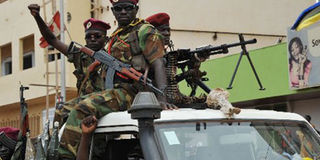Central Africa’s ex-Seleka leader to prevent elections in his turf

Seleka rebels on a pick-up truck during a meeting with the the rebel strongman, Michel Djotodia, on March 30, 2013, after he seized power in the Central African Republic. The transition authority established after the Seleka were chased from power in a French-led military intervention in 2014 is struggling to get the country back on its feet after decades of unrest and oppression. PHOTO | AFP
What you need to know:
- The country is preparing to hold a referendum on December 13 on a proposed new constitution ahead of nationwide polls on December 27, following years of violence after a bloody coup in 2013.
- Seleka has since split into multiple factions, of which the FPRC is among the most radical, refusing to acknowledge interim president Catherine Samba Panza.
BANGUI
An ex-Seleka rebel leader has said he will not allow elections due later this month to take place in the regions of the Central African Republic under his control.
The country is preparing to hold a referendum on December 13 on a proposed new constitution ahead of nationwide polls on December 27, following years of violence after a bloody coup in 2013.
“In the north and east, there are no hospitals, no schools, no roads. That’s what led us to take up arms,” said Nourredine Adam, leader of the Popular Front for the Renaissance of Central Africa (FPRC), a splinter faction of the former Seleka rebel group, on the private radio station Ndeke Luka.
“If they want to send in doctors or teachers, they will be welcome. But we will not accept any other type of government worker. Carrying out a vote in the current climate is not possible,” he said.
A source familiar with the matter told AFP that it would be potentially difficult to hold elections in the Kaga Bandoro region, where Adam has been based since the end of September along with 500 to 700 of his fighters.
One of the poorest and most unstable countries in the world, the landlocked former French colony plunged into chaos after president Francois Bozize, a Christian, was ousted in a coup in March 2013.
The mainly Muslim Seleka rebels behind the coup went on a bloody rampage that triggered the emergence of equally dangerous anti-balaka (anti-machete) militias in mostly Christian communities.
The transition authority established after the Seleka were chased from power in a French-led military intervention in 2014 is struggling to get the country back on its feet after decades of unrest and oppression.
Seleka has since split into multiple factions, of which the FPRC is among the most radical, refusing to acknowledge interim president Catherine Samba Panza.
Tensions remain high in the capital, where more than 100 people have been killed in tit-for-tat attacks between the two sides since late September.
Pope Francis made a high-profile visit to the country last week to press for national reconciliation, declaring that Christians and Muslims were brothers who must reject hatred.
Less than 24-hours after he left, violence resumed.





